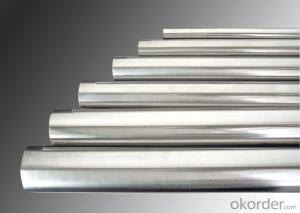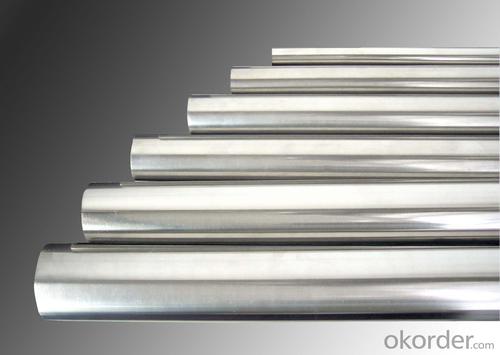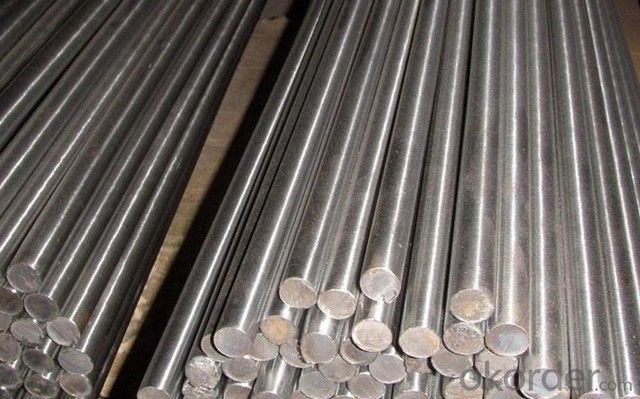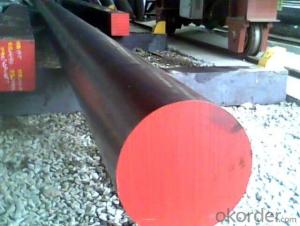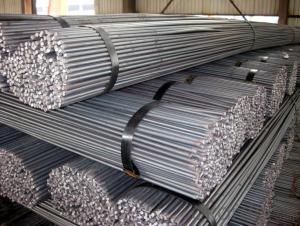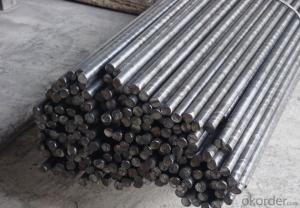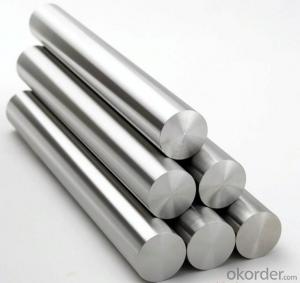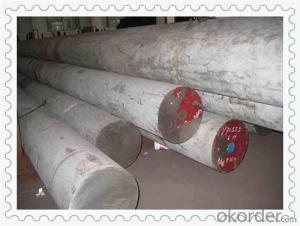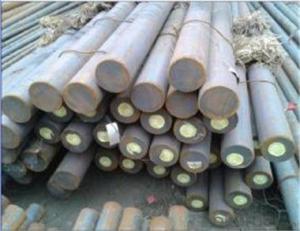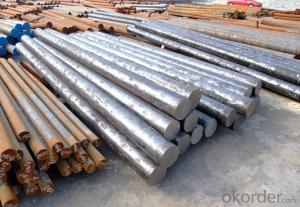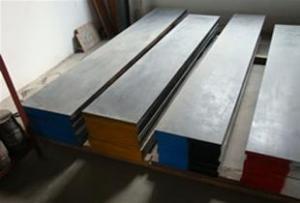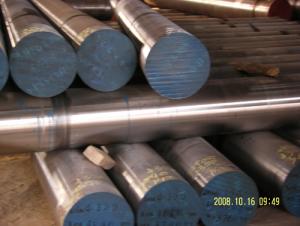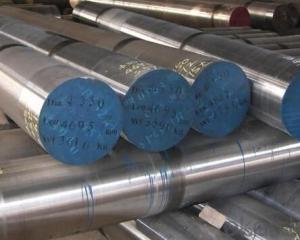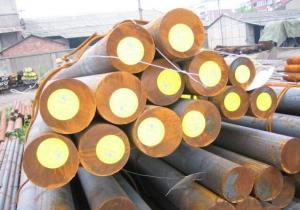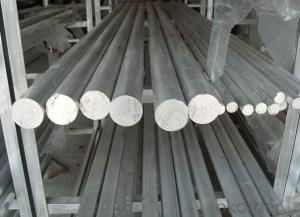0Cr19Ni513Mo3 Stainless High Quality Tool Steel
- Loading Port:
- China main port
- Payment Terms:
- TT or LC
- Min Order Qty:
- 25 m.t.
- Supply Capability:
- 10000 m.t./month
OKorder Service Pledge
OKorder Financial Service
You Might Also Like
Product Description:
OKorder is offering Tool Steel at great prices with worldwide shipping. Our supplier is a world-class manufacturer of steel, with our products utilized the world over. OKorder annually supplies products to European, North American and Asian markets. We provide quotations within 24 hours of receiving an inquiry and guarantee competitive prices.
Product Applications:
High Quality Bearing steel is used for manufacturing ball, roller bearing steel and rings. Bearing in work is under great pressure and friction, so have high demands bearing steel and hardness and resistance, and high elastic limit.
Bearing steels are used for ball and roller bearing applications and are comprised of low carbon steels and high carbon through harden able steel.
For example, bearing ring, steel rolling mill, machinery, 100Cr6 bearing steel ball is widely used in high-speed and low-noise bearing, bicycle, motorcycle, automobile, bags electronically.
Product Advantages:
OKorder's Tool Steel are durable, strong, and resist corrosion.
Main Product Features:
· Premium quality
· Prompt delivery & seaworthy packing (30 days after receiving deposit)
· Corrosion resistance
· Can be recycled and reused
· Mill test certification
· Professional Service
· Competitive pricing
Product Specifications:
Grade | bearing steel EN-31 |
Dimensions | Diameter: 20-280mm Length: 2000-5800mm |
Shape | Round Bar |
Type | High chromium bearing steel |
HBS | <220< span=""> |
Standard | AISI |
Technique | Hot Rolled |
Chemical Composition of High Quality Bearing Steel
C | S | P | Si | Mn |
0.95-1.05 | ≤0.025 | ≤0.025 | 0.15-0.35 | 0.25-0.45 |
Cr | Mo | Ni | Cu | Ni+Cu |
1.40-1.65 | ≤0.10 | ≤0.30 | ≤0.25 | ≤0.50 |
Note of High Quality Bearing Steel
1 The technical workers we employed are the ones with many years’ working experience, who know the technology procedures very well.
2 We will strictly inspect our production that we sold according to the customer’s request.
3 Our steel reaches international quality standards. Besides, our company is equipped with large-sized vertical saw machines, horizontal saw machines, milling machines, grinding machines and other advanced equipment. All our products are carried out hardness tests, such as the ultrasonic flaw detection before shipment. Therefore, there is no quality problem. With more competitive price than other suppliers, our steel has good sales in the markets of North America, South America, East Europe, Southeast Asia, Africa, Oceania, the Middle East, East Asia and West Europe.
FAQ:
Q1: Why buy Materials & Equipment from OKorder.com?
A1: All products offered byOKorder.com are carefully selected from China's most reliable manufacturing enterprises. Through its ISO certifications, OKorder.com adheres to the highest standards and a commitment to supply chain safety and customer satisfaction.
Q2: How do we guarantee the quality of our products?
A2: We have established an advanced quality management system which conducts strict quality tests at every step, from raw materials to the final product. At the same time, we provide extensive follow-up service assurances as required.
Q3: How soon can we receive the product after purchase?
A3: Within three days of placing an order, we will begin production. The specific shipping date is dependent upon international and government factors, but is typically 7 to 10 workdays.
Q4: What makes stainless steel stainless?
A4: Stainless steel must contain at least 10.5 % chromium. It is this element that reacts with the oxygen in the air to form a complex chrome-oxide surface layer that is invisible but strong enough to prevent further oxygen from "staining" (rusting) the surface. Higher levels of chromium and the addition of other alloying elements such as nickel and molybdenum enhance this surface layer and improve the corrosion resistance of the stainless material.
Q5: Can stainless steel rust?
A5: Stainless does not "rust" as you think of regular steel rusting with a red oxide on the surface that flakes off. If you see red rust it is probably due to some iron particles that have contaminated the surface of the stainless steel and it is these iron particles that are rusting. Look at the source of the rusting and see if you can remove it from the surface.
Images:
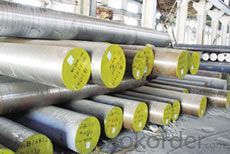
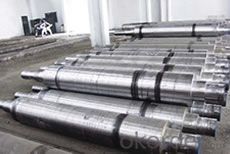
- Q: What is the difference between hot rolled and cold drawn steel round bars?
- Hot rolled steel round bars are produced by heating a steel billet or ingot at a high temperature and then rolling it into the desired shape. This process results in a rougher surface finish and a larger diameter tolerance compared to cold drawn steel round bars. Hot rolled bars are commonly used in applications where strength and durability are important, such as in construction and manufacturing. On the other hand, cold drawn steel round bars are produced by pulling a hot rolled bar through a die at room temperature, which results in a smoother surface finish and tighter diameter tolerances. This process also improves the mechanical properties of the steel, such as its strength and hardness. Cold drawn bars are often used in applications where precision and a high-quality surface finish are required, such as in the production of shafts, bolts, and precision components. In summary, the main differences between hot rolled and cold drawn steel round bars are the surface finish, diameter tolerance, and mechanical properties. Hot rolled bars have a rougher surface finish, larger diameter tolerances, and are typically used in applications where strength and durability are important. Cold drawn bars have a smoother surface finish, tighter diameter tolerances, and are commonly used in applications where precision and a high-quality surface finish are required.
- Q: Can steel round bars be coated with protective finishes?
- Yes, steel round bars can be coated with protective finishes. These finishes help to prevent corrosion, enhance durability, and provide additional resistance to wear and tear. Common protective finishes for steel round bars include coatings such as galvanization, powder coating, and epoxy coatings.
- Q: How do you prevent rusting of steel round bars?
- To prevent rusting of steel round bars, it is essential to apply protective coatings such as paint, epoxy, or galvanization. Regularly cleaning the bars and keeping them dry, particularly in humid environments, can also help prevent rust formation. Additionally, storing the bars in a controlled indoor environment or using moisture-absorbing materials like silica gel packets can further prevent rusting.
- Q: Can steel round bars be used in the manufacturing of pressure vessels?
- Pressure vessels can make use of steel round bars for their construction. These bars are commonly chosen due to their robustness and durability. The circular shape of these bars allows for an even distribution of stress and pressure, which makes them ideal for withstanding the internal pressure generated by the vessel's contents. Moreover, steel round bars can be easily manipulated, welded, and machined to meet the specific requirements of pressure vessel fabrication. However, it is crucial to ensure that the steel used in these bars complies with the necessary specifications and standards for pressure vessel manufacturing, such as those established by international codes like ASME or EN. Furthermore, it is imperative to conduct regular inspections, implement quality control measures, and adhere to relevant safety guidelines throughout the manufacturing procedure to guarantee the integrity and safety of the pressure vessel.
- Q: Can steel round bars be used in the automotive manufacturing?
- Yes, steel round bars can be used in automotive manufacturing. Steel round bars offer high strength and durability, making them suitable for various automotive components such as crankshafts, camshafts, axles, and suspension parts. They also provide excellent machinability and can be easily fabricated into the required shapes and sizes, making them a preferred choice in the automotive industry.
- Q: How are steel round bars classified based on their shape?
- Steel round bars are classified based on their shape into two main categories: hot-rolled round bars and cold-drawn round bars. Hot-rolled round bars are made by heating a steel billet until it becomes malleable and then passing it through a series of rollers to achieve the desired shape. This process results in a rougher surface texture and a slightly larger diameter compared to cold-drawn round bars. Hot-rolled round bars are commonly used in construction, engineering, and manufacturing applications where strength and durability are important. On the other hand, cold-drawn round bars are made by pulling a hot-rolled round bar through a series of dies at room temperature. This process improves the dimensional accuracy, surface finish, and mechanical properties of the steel. Cold-drawn round bars have a smoother surface texture and a more precise diameter, making them suitable for applications that require tight tolerances, such as precision machining, automotive components, and shafts for machinery. In summary, the classification of steel round bars based on their shape is determined by the manufacturing process used. Hot-rolled round bars are rougher and slightly larger in diameter, while cold-drawn round bars have a smoother surface texture and more precise dimensions. The choice between these two categories depends on the specific requirements of the application.
- Q: Can steel round bars be used in the production of tools?
- Certainly, the utilization of steel round bars in tool production is highly feasible. The exceptional strength, durability, and versatility of steel render it extensively employed in the manufacturing of tools. Specifically, steel round bars are frequently employed due to their capacity to undergo machining, forging, and heat treatment, thereby transforming into diverse tool components like cutting edges, shafts, handles, and dies. The elevated tensile strength, wear resistance, and corrosion resistance of steel round bars render them an ideal choice for tool production, guaranteeing both longevity and performance. Moreover, steel can be effortlessly tailored and molded to meet the specific requirements of various tools, establishing it as the preferred material within the industry.
- Q: What is the typical tolerance for diameter and length in steel round bars?
- The typical tolerance for diameter and length in steel round bars can vary depending on the specific industry standards and requirements. However, in general, the tolerance for diameter in steel round bars is typically around +/- 0.005 to 0.010 inches. This means that the actual diameter of the bar can be up to 0.010 inches larger or smaller than the specified diameter. Similarly, the tolerance for length in steel round bars is usually around +/- 0.125 to 0.250 inches. This means that the actual length of the bar can be up to 0.250 inches longer or shorter than the specified length. It is important to note that these tolerances can differ based on the intended application and the specific standards set by the manufacturing industry. Therefore, it is crucial to consult the relevant industry standards or the manufacturer's specifications to determine the precise tolerances required for a particular steel round bar.
- Q: How do steel round bars compare to carbon fiber round bars?
- Steel round bars and carbon fiber round bars are two different materials commonly used in various industries. Here is how they compare: Strength and Durability: Steel round bars are known for their exceptional strength and durability. They can withstand heavy loads, high temperatures, and harsh environments. Carbon fiber round bars, on the other hand, are also strong but are generally not as strong as steel bars. However, carbon fiber bars excel in terms of strength-to-weight ratio, making them a popular choice for applications where weight reduction is crucial. Weight: Steel round bars are significantly heavier than carbon fiber round bars. This weight difference often makes carbon fiber bars preferable in industries where weight reduction is important, such as aerospace and automotive sectors. Lighter bars can contribute to improved fuel efficiency, increased speed, and enhanced maneuverability. Corrosion Resistance: Steel round bars are prone to corrosion, especially when exposed to moisture and certain chemicals. Regular maintenance and protective coatings are often required to prevent rusting. On the other hand, carbon fiber round bars are inherently corrosion-resistant. This property makes carbon fiber bars valuable in environments where corrosion can be a concern, such as marine applications. Flexibility and Stiffness: Steel round bars are generally stiffer and less flexible compared to carbon fiber round bars. This characteristic can be advantageous in applications where rigidity and structural integrity are crucial, such as construction and heavy machinery. Carbon fiber round bars, on the other hand, offer higher flexibility and can be engineered to have different levels of stiffness, making them suitable for applications that require vibration damping or enhanced shock absorption. Cost: Steel round bars are generally more cost-effective compared to carbon fiber round bars. Steel is a widely available material, and its production costs are relatively low. Carbon fiber, on the other hand, is more expensive to produce due to the complex manufacturing process and the cost of raw materials. As a result, carbon fiber round bars tend to be pricier, limiting their use to industries where their unique properties justify the increased costs. In conclusion, steel round bars and carbon fiber round bars have their own advantages and disadvantages. Steel bars offer exceptional strength, durability, and cost-effectiveness, while carbon fiber bars excel in terms of weight reduction, corrosion resistance, flexibility, and stiffness. The choice between the two depends on the specific requirements of the application, including factors such as load-bearing capacity, weight reduction, corrosion resistance, and cost considerations.
- Q: What are the factors to consider when selecting a steel round bar for a specific application?
- When selecting a steel round bar for a specific application, several factors need to be considered. Firstly, the desired mechanical properties such as strength, hardness, and toughness should be evaluated based on the application's requirements. Secondly, the chemical composition of the steel, including elements like carbon, alloying elements, and impurities, should be analyzed to ensure compatibility with the intended use. Additionally, the dimensions and tolerances of the round bar must be considered to ensure proper fit and functionality. Other factors to consider include surface finish, heat treatment requirements, corrosion resistance, and cost. Overall, a comprehensive understanding of the application's needs and careful consideration of these factors will help in selecting the appropriate steel round bar.
Send your message to us
0Cr19Ni513Mo3 Stainless High Quality Tool Steel
- Loading Port:
- China main port
- Payment Terms:
- TT or LC
- Min Order Qty:
- 25 m.t.
- Supply Capability:
- 10000 m.t./month
OKorder Service Pledge
OKorder Financial Service
Similar products
Hot products
Hot Searches
Related keywords
